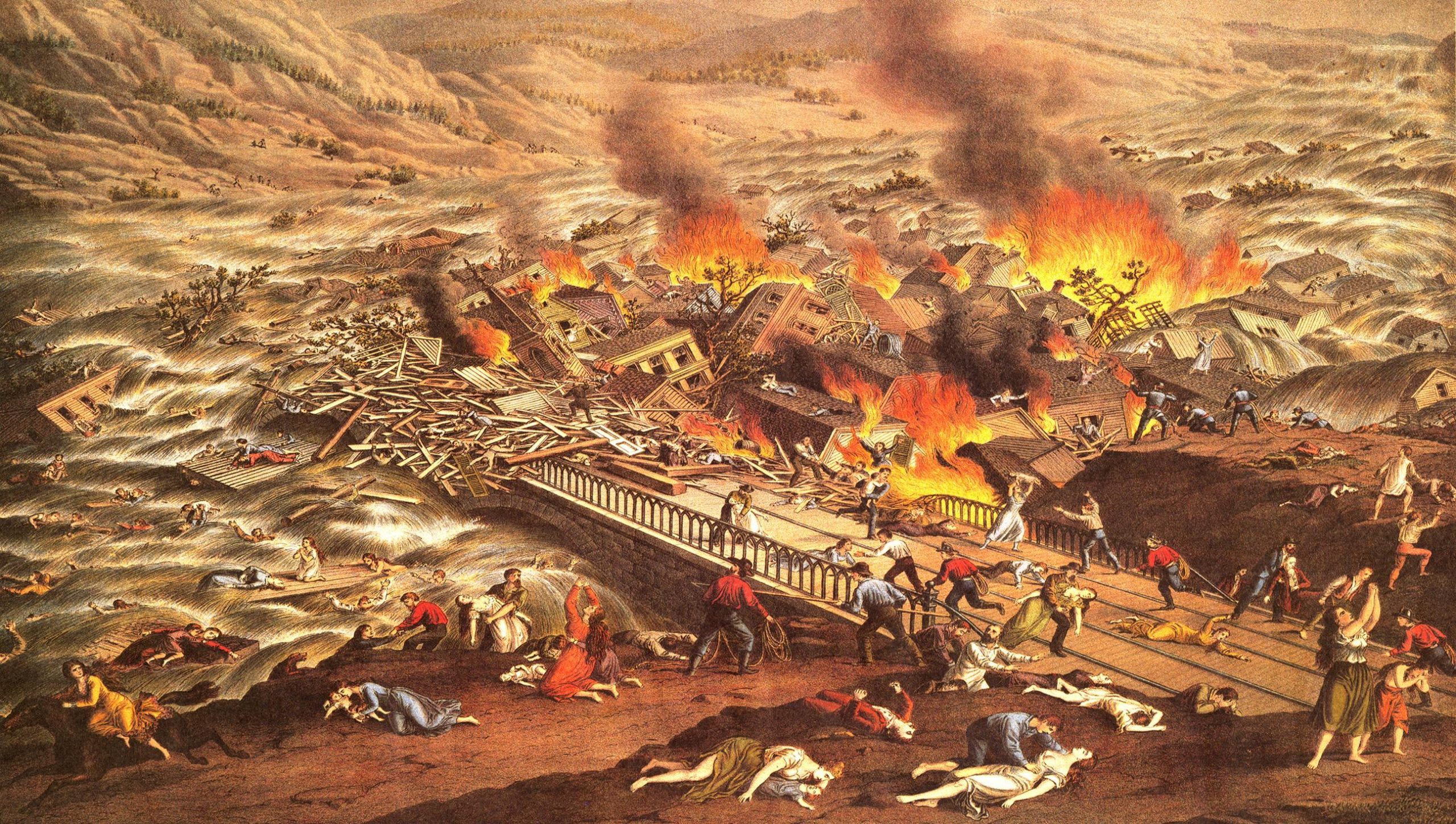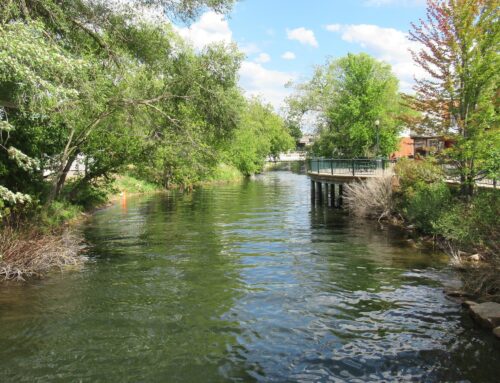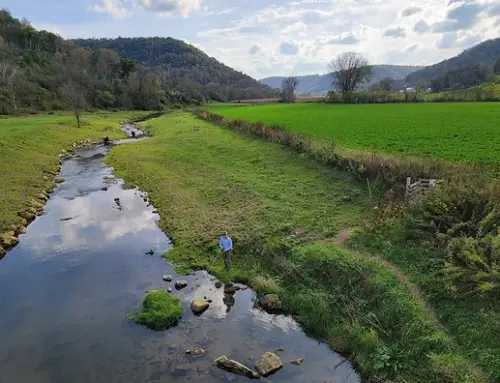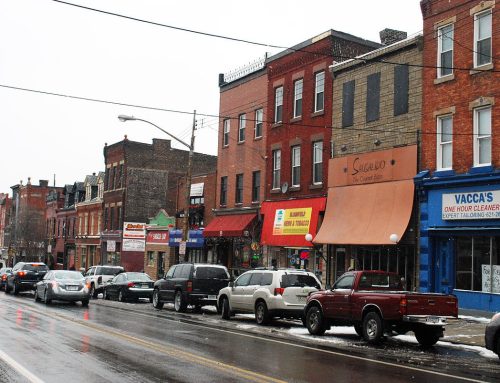By Clare Welsh
FAIRY TALE
After The Great Conemaugh Valley Disaster, Flood & Fire at Johnstown, PA, 1889
The town was once empty
light underwater.
There was no air.
And you wonder
why the men don’t speak.
Why the women
obsess over each turning
shoulder in the night—
This from the landlady
with dandruff and cigar ash
falling from her sleeve.
Anyway–
She trails into silence.
Who here
ever finished a sentence,
coughed up one
needful shape of love?
Hard to speak of tomorrow
with so much
yesterday pushing down
each cringed vowel.
The valley remembers
the black lake
like any crushed weight :
With daisies
thrust through fishbones,
foundations, the busted
stone dam
scattered as tossed knuckles
with fox teeth, car parts,
bent beer cans.
And if I meet a man at the base
of this green grave,
what of it?
The catholic garden
with its crossed wilderness
thickens the dusk,
whose glistened
frog throat croons
fucksong to the river.
A man strokes
the inside of my thigh
and the housewife in me
rises like a snake: another
copperhead I must shoot
from the back porch
of my mother’s
bold inheritance
of sacrifice.
If this were a fairytale,
if I were a child,
I would have been
orphaned
to a stepmother:
Do not, and I mean
do not let him
knock you up. The landlady wipes
blonde ale from the corner
of her dry lip.
Anyway–
⤕
The man unfolds
an antique etching
of the Johnstown flood.
The image seems
an omen, a gold weight
I must carry
in hope of trading
down the road
to some
cloaked pawn shop
in exchange for my own
wisdom, or beauty, or–
later, the etching hangs
in a room we share.
In the scene, people
like pale termites
swarm, the women
with waists
cinched, the men
in gray shirts pulling
splinters from water.
The waves carry
houses burning
to the horizon, visible
beyond the mountains
that–despite or
because of this violence–
appear gentle, stoned
onlookers gazing
dumb at the edge of grief.
On the riverbank,
foam, silt, gathered
bodies: A woman lays
with a still child.
A man stares
stoic at the breast
of a drowned woman,
her ankle twisted
under the hem
of a white dress.
A woman weeps.
A man makes himself useful.
The people die in shapes
of dolls. There is
the good mother.
The bleak father
rolling up his sleeves.
The water rises,
the smoke drifts,
no one unlaces
her corset, takes off
his strong face.
⤕
One social theory suggests people revert to so-called traditional gender roles in times of disaster; of course, any American saying traditional usually means colonial, that rigid urge to sequester the wilderness–the fire, the water–into fenced outlines of one man, one woman. This may explain the Victorian melodrama in this 1889 depiction of the Johnstown Flood.
Nothing is more attractive than a familiar pain. Here comes the highway billboard promising a return to greatness: It was great, then, wasn’t it, when she was holding the baby like a wisped ghost, when he was standing with his button-down shirt by the wooden chair, a photo of an industrious family developed on a glass plate, a glass family, fertile, glowing, god-fearing. They knew their place. They weren’t so complicated, so angry, then, when people were great, when everything was just so.
This may explain the doll people in the 1889 etching of the Johnstown Flood. Or, in 2017, this headline in Politico Magazine: “Johnstown Never Believed Trump Would Help. They Still Love Him Anyway.”
This may explain the cult of motherhood. The monument to fetal tissue in the Catholic cemetery. The nice church ladies who paid for the white granite, who keep paying for it.
This may explain the etching. The woman still laying with the child. The child laying still. The man with his rolled-up sleeves. The man and his witnessing to. The drowned.
She died how she lived: With her stomach sucked in.
He died how he lived: Never weeping.
This might explain the etching of 1889. Or my inability to relax until I finish dinner, dry the dishes, ask some man how he’s doing: Does he need anything? Can I get him some tea, a beer, some coffee maybe? Is there anything I can do here, anything, anything at all?
⤕
It’ll work only if you
make more money
than him, only if
you own the house,
trust the men here
always want
something in return,
if not some pissed
baby miracle, some kind
of mothering
from a woman, you get
nothing for free.
The landlady grips,
yanks a vine
from the side
of the row house.
Beneath the ivy,
a pale latticed
wood lace.
Anyway–
Landscaping,
Forty dollars.
Later, stripping
my clothes, seams
leave red lines
In hips, back, thigh.
What was I
supposed to do
with this,
the shape of my life?
⤕
Sex on the edge
of the church yard:
no moon, stars
or cars thrill
the darkness,
no world visible
we wreathe wrists
in the cold grass
hands reach
in and around
all the growing
flesh we cannot see.
⤕
In Pennsylvania, fairy tales follow Germanic logic:
Don’t go into the woods after dark. The wolves will eat you. The witches will seduce you.
If you are a boy, your task is to kill the wolves
and burn the witches.
If you are a girl, your task
is to outpace the wolves and betray the witches,
particularly those within,
to the boys.
The old woman will have what you need
though she is ugly, though you should work hard
to never become her.
Interweaving these fairytales are colonial directives:
This land is yours and you are
nothing if you do not own it. To own it you must earn your life. To earn is to take is to hurt is
to hunt hurt back, a cycle to nowhere, this
hero’s journey stuck
fidgeting under the boot.
Wealth is the only initiation.
You must initiate yourself.
Until then, do not speak of love.
Love without money is reality TV.
Love without money is a social media post about a mother
overdosing in the front seat of a car.
You’ve seen what they do to women like you.
⤕
Images of colonial gender roles resemble religious iconography: Here it comes again, the highway billboard of Donald Trump in rays of light, with white Jesus resting a hand on the shoulder of his bloated business suit. Here comes white Jesus with his heterosexual entourage of twelve men. With his chaste, baby-faced Magdalene turning her cleavage to the wine. Look long enough, and you’ll find in every icon a contradiction. This is why you can’t look long, if you want them to remain useful.
In the chaos of political upheaval, I could bypass the task of developing a complete consciousness. Put off the toil of mature spirituality by assuming the identity of an archetype. Ask this archetype to save me, save us with her white dress. His blue suit. Their snappy answer to the question of what to do about the flood, the fire, the children dying in schoolhouses carried by waves to the bright distance.
⤕
In the lower left
corner of the etching,
a woman in gold
gallops away on horseback.
If loss is the horse,
I am the rider.
Where I’m going,
I cannot carry
my mother
scrubbing the carpet,
boiling the eggs,
setting my sprained ankle
alone. The flood churns
trees and train cars
across the road.
I must find another.
I must find my own
face in the dark.
⤕
Every fifty miles or so, two billboards repeat. They repeat the entire length of the Pennsylvania highway, from the Ohio border to Philadelphia. The billboards ask brash questions:
Where are you going?
HEAVEN or HELL?
SHACKLED by Lust?
Shackled by LUST?
I am shackled by lust. I am going to hell on a horse I pulled from the mud of the Appalachian housewife I was expected to be.
I need the Appalachian housewife more than she needs me. Her eternal giving. Her Madonna mouth. Her pickling jar callouses. Her absolute lack of dreaming.
Housewife archetypes tidy every corner of America, but the Appalachian housewife is an especially impossible archetype to embody, for not only is she endlessly giving, but endlessly self-sufficient. She doesn’t ask for help. She is the helping verb itself, an invisible string. Her working-class station renders her a seamstress, a maid, a nurse to the families of Andrew Carnegie, Cornelius Vanderbilt, Richard Murdock, Jeff Bezos–over a century of mad kings. With gray hands sifting over the dark, pointless mountains. The lost land.
Historically, the helping role of such women was pre-determined by colonial law; however, it’s not the old law, but my unconscious, internalized mirroring of it that corsets my spine. Tied in this shape, I put off the work of weaving a complete personality of desires, contradictions. Dreams.
This rigid archetype is an avoidance tactic not only for me, but for potential lovers. In the same way the housewife embalms her peppers in vinegar, saves them from the bite of time, she saves her lovers from the task of maturing. She sweeps their crumbs. Apologizes for their gruff comments. Teaches them tenderness as she would a child.
She is the good mother and she was a good mother and I would not leave her now if I had any other choice.
I am shackled by lust. I am going to hell on a horse. The river floods from the house the altar cloth, the broomsticks, the sprigs of dried lavender. The old love spell carries itself away. I must wreath from the wreckage a new circle.
⤕
The landlady remembers
my man for his
beat black car.
You can do better
than that. Anyway–
I am learning her
transactional logic.
I do not
follow it
or any other
laid like a contract
on the table
of knife marks
and loose tobacco.
I am done with
faux ownership,
the oaths
of stepmothers,
good mothers, of
woodsmen, hunters.
When I love a man
I stroke the fur
of the wolf
inside him, the hair
of the witch in me.
It is like pushing
through a curtain,
feeling the warm glass
of a window looking out
at what the rain left
in the yard:
glint metal in grass,
a wet horse grazing
around white caps
of mushrooms
pulling themselves
soft and silent
out from the valley,
the cold body
of the flood.
Clare Welsh lives in Pittsburgh and was raised in Indiana County, Pennsylvania. Her writing focuses on the culture of this region. Here recent writing about the region can be found here in The Southeast Review , The L.A. Review , and Trampset . She is an editor at large for Fine Print Paper, a free poetry and art newsprint zine disturbed in Pittsburgh and beyond.






